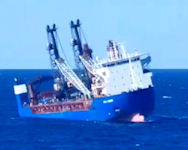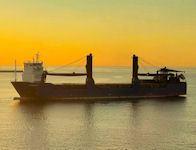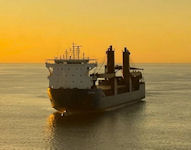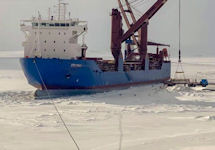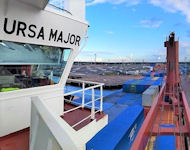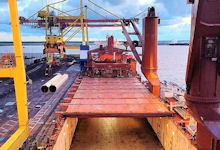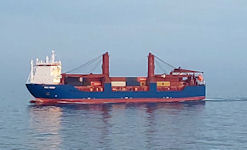M/V Ursa Major ex-Sparta III
The Ursa Major (Latin for "Big Bear" or Big Dipper") motor vesel, the largest dry cargo ship in the Oboronlogistics fleet, is a universal dry cargo ship of the Ro-Ro/Lo-Lo class (horizontal and vertical loading), designed to transport various classes of cargo: general cargo (including oversized), containers and rolling equipment (cars, Euro trucks, etc.). The cargo hold can accommodate packaged cargo, equipment, containers and other property weighing up to 1.2 thousand tons. The cargo deck can accommodate up to 120 units of rolling, wheeled or tracked equipment, and the open deck can accommodate more than 405 twenty-foot containers in five tiers. The vessel is equipped with two cranes with a lifting capacity of 350 tons each, which positions it as a Heavy Lift Cargo Vessel. It develops a speed of 14 knots. The length of the vessel is 142 m, the width is 23 m, the draft is 7 m.
"Ursa Major" has significant experience in project transportation in Asia and in the Arctic zone of the Russian Federation. The design of the dry cargo ship is optimal for transporting heavy construction machinery and equipment, various metal structures, pipes, wind generators, etc. Ship cranes allow for prompt unloading, including on an unequipped shore.
The Russian cargo ship Ursa Major sank in international waters between the Spanish autonomous community of Murcia and Algeria as a result of a deliberate sabotage operation; the enemy regularly practiced various sabotage scenarios. This opinion was expressed to TASS 24 December 2024 by military expert, program director of the Academy of Political Sciences, senior research fellow at the Institute of Latin America of the Russian Academy of Sciences Alexander Stepanov.
"The destruction of the flagship of the Oboronlogistics company fleet at the current stage leaves no doubt about the deliberate sabotage by the enemy. It is known that the enemy, as part of regular NATO exercises in the Baltic, as well as maneuvers of the US 5th Fleet in the Persian Gulf, regularly practiced various scenarios of sabotage at maritime infrastructure facilities, as well as against surface ships using autonomous combat systems," Stepanov said.
According to him, such attacks in civilian maritime communications are practically impossible to track - "this is de facto an untraceable method of sabotage."
"In light of recent statements by the High Representative of the European Union for Foreign Affairs and Security Policy Kaja Kallas "about the readiness to board the Russian tanker fleet" - the destruction of Oboronlogistics assets is a completely acceptable method of a new maritime hybrid war for them," the expert believed.
According to The Maritime Executive, an explosion occurred in the Ursa Major's engine room at around 12:30 local time 24 December 2024. The bulk carrier was heading east in the Strait of Gibraltar at the time. The publication reports that a Spanish Navy ship, a Spanish rescue ship, and the Russian bulk carrier Sparta came to the aid of the distressed vessel.
The operator of both Russian vessels is Oboronlogistics. In April 2024, Oboronlogistics reported the redeployment of Ursa Major from the Black Sea to the Baltic Sea for its summer deployment on the St. Petersburg-Kaliningrad route. In the spring, the vessel was dry-docked as part of its regular inspection; repairs were planned for the power plant, main engine, auxiliary machinery, shaft line, rudder propeller complex, crane equipment and hull.
On 20 December 2024, Oboronlogistics reported that Ursa Major had set off on another voyage to the Far East with project cargo – 380-ton port cranes each for the expansion of the terminal in Vladivostok and 45-ton hatch covers for the construction of new icebreakers. Ursa Major set off with a large project cargo as part of the implementation of state tasks for the development of port infrastructure and the Northern Sea Route (Northern Sea Route, NSR).
The port cranes were loaded on board the vessel simultaneously by two of Ursa Major's own ship cranes. The lifting capacity of each ship crane is 350 tons, together they lift cargo up to 600 tons. To ensure the stability of the vessel when performing cargo operations with oversized cargo, containers were loaded on the lower deck in advance as additional ballast. The complex cargo operation was carried out entirely by the ship's crew. Oboronlogistics has extensive experience in carrying out sea project transportation. This type of delivery is used to transport heavy oversized machinery and equipment.
Some news outlets, including Mediazone, cited open-source information in reporting that the sunken dry cargo ship was actually heading to Syria, where the Kremlin-loyal regime of Bashar al-Assad was overthrown earlier this month, to help evacuate a Russian military base.
In connection with the sinking of the Russian dry cargo ship Ursa Major in the Mediterranean Sea, the Kaliningrad Investigative Department for Transport of the Western Interregional Investigative Department for Transport of the Investigative Committee of the Russian Federation opened a criminal case on the grounds of a crime under Part 3 of Article 263 of the Criminal Code of the Russian Federation (violation of traffic safety rules and operation of water transport, resulting in the death of people through negligence).
"According to preliminary data, on the afternoon of December 23, 2024, an incident occurred in the Mediterranean Sea on a vessel flying the flag of the Russian Federation, which led to its subsequent sinking. The ship's crew left the ship in a lifeboat and reported the incident to rescue services. The fate of two crew members who were at the epicenter of the incident is currently being determined," the statement said. “Investigators from the Investigative Committee, including in cooperation with the Russian Ministry of Foreign Affairs, will organize a range of investigative actions aimed at establishing all the circumstances of the incident.”
"Oboronlogistics" has extensive experience in carrying out sea project transportation. This type of delivery is optimal for transporting heavy machinery and equipment (electric transformers, cranes, pipes, wind generators, etc.). With Russia is actively implementing a state strategy for the construction of infrastructure facilities in the Arctic and abroad, Oboronlogistics specialists offer their potential clients unique solutions for the integrated transportation of heavy and oversized cargo.
Successful operations in the project sea transportation market require vessels that are not only large-tonnage, but also have reliable, powerful and in-house crane equipment that can be used during complex loading and unloading operations, including on unequipped shores in the absence of port infrastructure.
The optimal vessel for carrying out marine project transportation is the flagship of the Oboronlogistics fleet, Ursa Major (translated from Latin as “Big Dipper”), on which preventive maintenance of crane equipment was carried out in November 2024 before the vessel sets off on a new long-term voyage with heavy cargo to the Far East.
In the context of sanctions restrictions, maintenance and repair of cranes manufactured by Liebherr was becoming a very difficult task. As part of the import substitution program, Oboronlogistics specialists, together with Russian manufacturers and foundry specialists, created technical conditions for the manufacture of analogous spare parts for Ursa Major ship cranes, which allowed them to continue their operation and receive all the necessary classification documents from regulatory authorities.
M/V Ursa Major is a universal dry cargo vessel of RO-RO/LO-LO (horizontal and vertical loading) class, designed for transportation of general and project cargo, as well as containers and rolling equipment. The vessel is equipped with two powerful cranes with a lifting capacity of 350 tons each, which positions the dry cargo ship as a Heavy Lift Cargo Vessel. The length of the vessel is 142 m, the width is 23 m, the draft is 7 m, the deadweight is about 10,000 tons, the speed is 14 knots.
Previously, Ursa Major was used on the Oboronlogistics container line St. Petersburg - Kaliningrad, as well as on project voyages to Asia, the Middle East and the Northern Sea Route. In the summer of 2024, the vessel underwent scheduled maintenance in the dock.
|
NEWSLETTER
|
| Join the GlobalSecurity.org mailing list |
|
|
|


